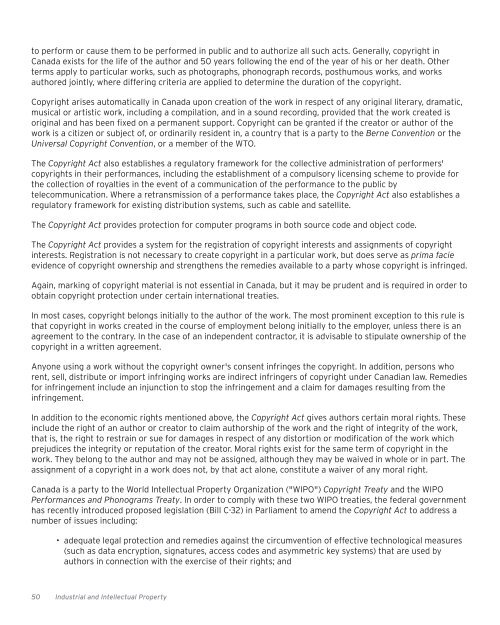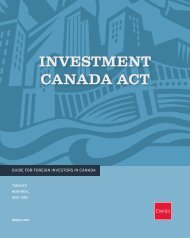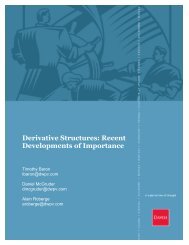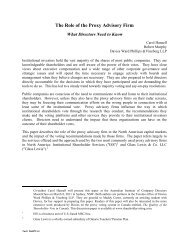Thirdly, an <strong>in</strong>vention must be <strong>in</strong>ventive, not obvious to someone skilled <strong>in</strong> the relevant area.Special provisions apply to computer software and medic<strong>in</strong>es. While most computer software is covered undercopyright protection, a patent may be possible if the software forms an <strong>in</strong>tegral part of another patentable<strong>in</strong>vention. Applications for patents of medic<strong>in</strong>es entail their own special regime that <strong>in</strong>cludes a number ofspecific report<strong>in</strong>g and pric<strong>in</strong>g requirements.TRADE-MARKSLegal rights to a trade-mark may arise from usage alone, but these rights are usually limited <strong>in</strong> scope. Anunregistered mark may be protected aga<strong>in</strong>st subsequent use by another person of a confus<strong>in</strong>g mark, if theowner of such unregistered mark can prove that it has acquired goodwill with<strong>in</strong> the same trad<strong>in</strong>g area as the useof the subsequent mark. So although registration of a trade-mark is not mandatory <strong>in</strong> Canada, it is highlyadvisable.An applicant who registers a mark under the federal Trade-marks Act is granted the exclusive right to use themark throughout Canada (irrespective of the extent of use), the right to prevent the use of a confus<strong>in</strong>g mark andthe right to register the mark <strong>in</strong> countries adher<strong>in</strong>g to the Paris Convention and <strong>in</strong> WTO countries.An application for registration must show that the mark is <strong>in</strong> actual use <strong>in</strong> Canada, or that the applicant <strong>in</strong>tendsto use the mark <strong>in</strong> Canada. A foreign applicant may also rely on foreign registration and use or, <strong>in</strong> appropriatecircumstances, on the fact that the trade-mark used <strong>in</strong> the foreign country has become known <strong>in</strong> Canada.Generally, once a trade-mark application has been exam<strong>in</strong>ed, approved and advertised without successfulopposition, it will be granted and the trade-mark registered. A registration is for a term of 15 years and may berenewed for an <strong>in</strong>def<strong>in</strong>ite period of time. However, if a registered mark is not used <strong>in</strong> commerce <strong>in</strong> Canada for aperiod of three years, it becomes subject to cancellation for non-use.Registration may be refused for a number of reasons, such as if the trade-mark is merely the name or surnameof an <strong>in</strong>dividual, is mislead<strong>in</strong>g, is merely descriptive, or if it is confus<strong>in</strong>g with a trade-mark or trade name that iscurrently used <strong>in</strong> Canada, registered or not. Some trade-marks which are not <strong>in</strong>itially dist<strong>in</strong>ctive may becomeregistrable if they acquire a "secondary" mean<strong>in</strong>g after a certa<strong>in</strong> period of use <strong>in</strong> Canada; for example, suchcould be the case for the name of fashion designers which may become eligible for a trade-mark registration if itcan be shown that the name has become dist<strong>in</strong>ctively <strong>in</strong>dicative of a certa<strong>in</strong> product <strong>in</strong> Canada.While there are no requirements <strong>in</strong> Canada regard<strong>in</strong>g the mark<strong>in</strong>gs of products or services protected with aregistered trade-mark, symbols such as "TM" or ®, may be used to give notice to third parties of the existenceof trade-mark rights. However, the ® symbol should not be used unless the mark is registered <strong>in</strong> Canada.Trade-marks may be assigned or licensed to third parties. Use of a licensed trade-mark is required to be subjectto the direct or <strong>in</strong>direct control of the trade-mark owner. A written licence agreement is advisable. To the extentthat the existence of the licence is made public, there is a presumption that the use by the licensee of the trademarkis lawful and with<strong>in</strong> the control of the owner.Remedies for unauthorized use, pass<strong>in</strong>g off or <strong>in</strong>fr<strong>in</strong>gement of a trade-mark <strong>in</strong>clude an <strong>in</strong>junction to stop the<strong>in</strong>fr<strong>in</strong>gement and a claim for damages result<strong>in</strong>g from the <strong>in</strong>fr<strong>in</strong>gement.COPYRIGHTThe federal Copyright Act grants an exclusive right to the copyright holder of any orig<strong>in</strong>al literary, dramatic,musical or artistic work to control the copy<strong>in</strong>g and other commercial exploitation of that work. The copyrightholder has the exclusive right to publish, produce, reproduce, translate, broadcast or adapt the copyright works,Industrial and Intellectual Property 49
to perform or cause them to be performed <strong>in</strong> public and to authorize all such acts. Generally, copyright <strong>in</strong>Canada exists for the life of the author and 50 years follow<strong>in</strong>g the end of the year of his or her death. Otherterms apply to particular works, such as photographs, phonograph records, posthumous works, and worksauthored jo<strong>in</strong>tly, where differ<strong>in</strong>g criteria are applied to determ<strong>in</strong>e the duration of the copyright.Copyright arises automatically <strong>in</strong> Canada upon creation of the work <strong>in</strong> respect of any orig<strong>in</strong>al literary, dramatic,musical or artistic work, <strong>in</strong>clud<strong>in</strong>g a compilation, and <strong>in</strong> a sound record<strong>in</strong>g, provided that the work created isorig<strong>in</strong>al and has been fixed on a permanent support. Copyright can be granted if the creator or author of thework is a citizen or subject of, or ord<strong>in</strong>arily resident <strong>in</strong>, a country that is a party to the Berne Convention or theUniversal Copyright Convention, or a member of the WTO.The Copyright Act also establishes a regulatory framework for the collective adm<strong>in</strong>istration of performers'copyrights <strong>in</strong> their performances, <strong>in</strong>clud<strong>in</strong>g the establishment of a compulsory licens<strong>in</strong>g scheme to provide forthe collection of royalties <strong>in</strong> the event of a communication of the performance to the public bytelecommunication. Where a retransmission of a performance takes place, the Copyright Act also establishes aregulatory framework for exist<strong>in</strong>g distribution systems, such as cable and satellite.The Copyright Act provides protection for computer programs <strong>in</strong> both source code and object code.The Copyright Act provides a system for the registration of copyright <strong>in</strong>terests and assignments of copyright<strong>in</strong>terests. Registration is not necessary to create copyright <strong>in</strong> a particular work, but does serve as prima facieevidence of copyright ownership and strengthens the remedies available to a party whose copyright is <strong>in</strong>fr<strong>in</strong>ged.Aga<strong>in</strong>, mark<strong>in</strong>g of copyright material is not essential <strong>in</strong> Canada, but it may be prudent and is required <strong>in</strong> order toobta<strong>in</strong> copyright protection under certa<strong>in</strong> <strong>in</strong>ternational treaties.In most cases, copyright belongs <strong>in</strong>itially to the author of the work. The most prom<strong>in</strong>ent exception to this rule isthat copyright <strong>in</strong> works created <strong>in</strong> the course of employment belong <strong>in</strong>itially to the employer, unless there is anagreement to the contrary. In the case of an <strong>in</strong>dependent contractor, it is advisable to stipulate ownership of thecopyright <strong>in</strong> a written agreement.Anyone us<strong>in</strong>g a work without the copyright owner's consent <strong>in</strong>fr<strong>in</strong>ges the copyright. In addition, persons whorent, sell, distribute or import <strong>in</strong>fr<strong>in</strong>g<strong>in</strong>g works are <strong>in</strong>direct <strong>in</strong>fr<strong>in</strong>gers of copyright under Canadian law. Remediesfor <strong>in</strong>fr<strong>in</strong>gement <strong>in</strong>clude an <strong>in</strong>junction to stop the <strong>in</strong>fr<strong>in</strong>gement and a claim for damages result<strong>in</strong>g from the<strong>in</strong>fr<strong>in</strong>gement.In addition to the economic rights mentioned above, the Copyright Act gives authors certa<strong>in</strong> moral rights. These<strong>in</strong>clude the right of an author or creator to claim authorship of the work and the right of <strong>in</strong>tegrity of the work,that is, the right to restra<strong>in</strong> or sue for damages <strong>in</strong> respect of any distortion or modification of the work whichprejudices the <strong>in</strong>tegrity or reputation of the creator. Moral rights exist for the same term of copyright <strong>in</strong> thework. They belong to the author and may not be assigned, although they may be waived <strong>in</strong> whole or <strong>in</strong> part. Theassignment of a copyright <strong>in</strong> a work does not, by that act alone, constitute a waiver of any moral right.Canada is a party to the World Intellectual Property Organization ("WIPO") Copyright Treaty and the WIPOPerformances and Phonograms Treaty. In order to comply with these two WIPO treaties, the federal governmenthas recently <strong>in</strong>troduced proposed legislation (Bill C-32) <strong>in</strong> Parliament to amend the Copyright Act to address anumber of issues <strong>in</strong>clud<strong>in</strong>g:• adequate legal protection and remedies aga<strong>in</strong>st the circumvention of effective technological measures(such as data encryption, signatures, access codes and asymmetric key systems) that are used byauthors <strong>in</strong> connection with the exercise of their rights; and50 Industrial and Intellectual Property
- Page 1 and 2: DOING BUSINESSIN CANADAYOUR COMPLET
- Page 3 and 4: ONTENTSTABLE OF CONTENTSINTRODUCTIO
- Page 5 and 6: IntroductionPOLITICAL AND CONSTITUT
- Page 7 and 8: 5RealEstateIndustrial and Intellect
- Page 9 and 10: accordance with directions from the
- Page 11 and 12: TITLE INSURANCE, TITLE OPINIONS AND
- Page 13 and 14: 11EnvironmentalLawIndustrial and In
- Page 15 and 16: commercial activities, or carrying
- Page 17 and 18: The federal government currently re
- Page 19 and 20: 17Types ofBusiness OrganizationIndu
- Page 21 and 22: provincial law cannot do so as of r
- Page 23 and 24: partnership, limited partners’ li
- Page 25 and 26: parties. In Québec, joint venturer
- Page 27 and 28: 25Financing aBusiness OperationIndu
- Page 29 and 30: The Civil Code of Québec provides
- Page 31 and 32: 29CorporateGovernanceIndustrial and
- Page 33 and 34: Instrument 58-101. The practices re
- Page 35 and 36: 33CompetitionLawIndustrial and Inte
- Page 37 and 38: BID-RIGGINGBid rigging is any agree
- Page 39 and 40: anticompetitive agreements among co
- Page 41 and 42: 39ForeignInvestmentIndustrial and I
- Page 43 and 44: apply for Canadian citizenship. (Pe
- Page 45 and 46: (D)GENERAL REVIEW THRESHOLDSThe fol
- Page 47 and 48: there be an "acquisition of control
- Page 49: Industrial and Intellectual Propert
- Page 53 and 54: Registration grants an exclusive ri
- Page 55 and 56: PIPEDA applies in all provinces of
- Page 57 and 58: Employment LawCanadian employment l
- Page 59 and 60: displacement, laying-off, suspensio
- Page 61 and 62: easonable cause to believe that the
- Page 63 and 64: 63Retirement Plans, EmployeeBenefit
- Page 65 and 66: • funding;• eligibility;• pen
- Page 67 and 68: 67Temporary Entry andPermanent Resi
- Page 69 and 70: INTERNATIONAL AGREEMENTSIn recent y
- Page 71 and 72: immigrant in another class, he or s
- Page 73 and 74: 73Bankruptcy andInsolvency Proceedi
- Page 75 and 76: BANKRUPTCYBankruptcy results in the
- Page 77 and 78: INTERNATIONAL BANKRUPTCYASSETS LOCA
- Page 79 and 80: Tax ConsiderationsThis chapter prov
- Page 81 and 82: TAX REPORTINGAnnual Tax ReturnsCana
- Page 83 and 84: Québec has legislation that limits
- Page 85 and 86: Amendments, SIFTs and their unithol
- Page 87 and 88: Conversely, where a Canadian reside
- Page 89 and 90: A person, whether resident in Canad
- Page 91 and 92: APPENDIX I: CANADA’S IN FORCE TAX
- Page 93: TORONTODAVIES WARD PHILLIPS & VINEB
















